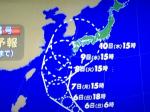[T]here remains a general tendency amongst expats, not to mention tourists, to accentuate their adventures and downplay their daily routine, those few moments and, over the course of one’s time spent overseas, increasingly unremarkable encounters. That’s something of a regrettable thing. I believe it’s often the case that the seemingly normal things, if savoured, can become uncanny things. These strange mundanities then weave themselves into the fabric of moment-to-moment life and incorporate slightly off-base or out of whack aspects into that which would otherwise (and unfairly) consider an ordinary day. –Richard Russell, Dancing over Kyoto, 2013
It’s been awhile since I wrote anything, almost a month in fact. Mostly it is because I have been busy teaching at the University, which allows me little time to think of interesting ideas to write about. But also because I was thinking about this quote, I can appreciate the author’s regret, it is one I share. Maybe it is because I am not a great writer, that I cannot capture the mundane as Richard Russell (and myself) would like to do. I had almost given up writing anything to do for public consumption, and concentrated instead of updating my diary. I re-read my post to spell check it. It read:
Sunday 6th July 2014
Busy and now typhoon season is upon us. Typhoon Neoguri, the second typhoon of the pacific season for this year approaches Japan. Should make landfall in Okinawa on the 8th and should be on Honshu on the 10th. Usually brushes past Osaka. Still flashlights bought, lithium batteries charged in case of blackout. Minae flying up to Sapporo on the 11th which is worrying could still be windy and stormy around Hokkaido.
As I read it back, I realised why recording the ordinary and the everyday of life in Japan is so difficult.
It really isn’t ordinary. Of course, here in Japan like everywhere else, there is the ordinary, minutia of everyday existence; hair needs cutting, food needs eating, apartments needs vacuuming, bills need paying an so on. People here, get up, have breakfast, go to work, come home, maybe read a newspaper and watch the news before going to sleep. Only when they watch the news and weather report, sometimes this happens.
Yes, its typhoon season again as typhoon Neoguri, approaches Japan. Maybe it is different if you a foreigner from a country that has more extreme weather, Britain is virtually mono-seasonal, it has Winter; which runs from November until February and Autumn for the rest of the year. A gale force wind or temperatures in excess of twenty centigrade are considered extreme. Nobody needs to remind you to make sure your flashlight batteries are at full power, or whether your lithium battery is charged in case of blackout, aside from the occasional powercut there isn’t going to be a blackout, although floods are becoming more common.
Of course, it isn’t really odd routines about the weather, whether they be earthquakes, tsunami or typhoons, that make living in Japan un-ordinary but how quickly you incorporate those routines into your way of living, they become, not just normal and everyday, it becomes unthinkable that you could act otherwise. And it’s not just a routine for typhoons, for example passports are kept in a safe, but accessible place in case of emergency evacuation due to earthquakes or tsunami, passports and some other documents related to marriage and residency in Japan in fact, and a bit of cash, in case you haven’t been to the bank when calamity strikes.
Surely, you might say, there are humdrum things such as paying bills. Bills you say, you mean things like electricity and water bills which you pay at convenience stores?
Nothing is ordinary, everything is experienced as exceptional, and it when you reflect on it, and recognise it as an experience of the uncanny, that sense of exceptionality is heightened. And yet the writer in me is not satisfied with that, there must be a way to capture the mundane. But I have yet to find the way, and now typhoon season has begun, everything will a little more ‘exceptional’ than usual, as I now live in a world where, with great regularity you have to check your flashlight, lithium battery, as well as water and food supplies.
It is in no way ordinary, but this is how I live, at least for now.

I really like to read about your extraordinary ordinary life in Japan and I hope that you will keep sharing it 😉
LikeLike
Thanks I’m sure I will. The need for work often interferes with writing, but without there would be nothing to write about!
LikeLike
Yes, work is definitely a hurdle I am struggling to (regarding writing time). The problem is that for me work provides nothing I could write about on my Japan related blog ^^”
LikeLike
I must write something about working at a Japanese university sometime in the future although it would have to be in general terms to hide identities if my co-workers.
LikeLike
Nice. We can’t underestimate the “everyday”. Not least because when we look at it, it is often very extraordinary. So special. I like reading about your extraordinary experiences that become everyday but . . .not so very. Nice.
LikeLike
It’s so difficult to step back from your everyday, to see what it is that makes it unique. But, to someone who doesn’t live in Japan – your everyday might be exciting. I have never been to Japan, but I find myself watching videos/ reading articles on the most mundane topics and enjoying them 🙂
LikeLike
Yes it must seem exciting, and often times that is how I experience it. But you begin to wonder whether it really is after awhile or whether you are just ‘hyping it up’. Thanks for the comment and for reading.
LikeLike
How I Live in Now in Japan | Demo Site